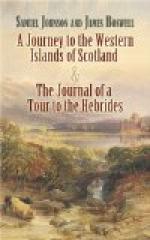A man of the Hebrides, for of the women’s diet I can give no account, as soon as he appears in the morning, swallows a glass of whisky; yet they are not a drunken race, at least I never was present at much intemperance; but no man is so abstemious as to refuse the morning dram, which they call a skalk.
The word whisky signifies water, and is applied by way of eminence to strong water, or distilled liquor. The spirit drunk in the North is drawn from barley. I never tasted it, except once for experiment at the inn in Inverary, when I thought it preferable to any English malt brandy. It was strong, but not pungent, and was free from the empyreumatick taste or smell. What was the process I had no opportunity of inquiring, nor do I wish to improve the art of making poison pleasant.
Not long after the dram, may be expected the breakfast, a meal in which the Scots, whether of the lowlands or mountains, must be confessed to excel us. The tea and coffee are accompanied not only with butter, but with honey, conserves, and marmalades. If an epicure could remove by a wish, in quest of sensual gratifications, wherever he had supped he would breakfast in Scotland.
In the islands however, they do what I found it not very easy to endure. They pollute the tea-table by plates piled with large slices of cheshire cheese, which mingles its less grateful odours with the fragrance of the tea.
Where many questions are to be asked, some will be omitted. I forgot to inquire how they were supplied with so much exotic luxury. Perhaps the French may bring them wine for wool, and the Dutch give them tea and coffee at the fishing season, in exchange for fresh provision. Their trade is unconstrained; they pay no customs, for there is no officer to demand them; whatever therefore is made dear only by impost, is obtained here at an easy rate.
A dinner in the Western Islands differs very little from a dinner in England, except that in the place of tarts, there are always set different preparations of milk. This part of their diet will admit some improvement. Though they have milk, and eggs, and sugar, few of them know how to compound them in a custard. Their gardens afford them no great variety, but they have always some vegetables on the table. Potatoes at least are never wanting, which, though they have not known them long, are now one of the principal parts of their food. They are not of the mealy, but the viscous kind.
Their more elaborate cookery, or made dishes, an Englishman at the first taste is not likely to approve, but the culinary compositions of every country are often such as become grateful to other nations only by degrees; though I have read a French author, who, in the elation of his heart, says, that French cookery pleases all foreigners, but foreign cookery never satisfies a Frenchman.
Their suppers are, like their dinners, various and plentiful. The table is always covered with elegant linen. Their plates for common use are often of that kind of manufacture which is called cream coloured, or queen’s ware. They use silver on all occasions where it is common in England, nor did I ever find the spoon of horn, but in one house.




